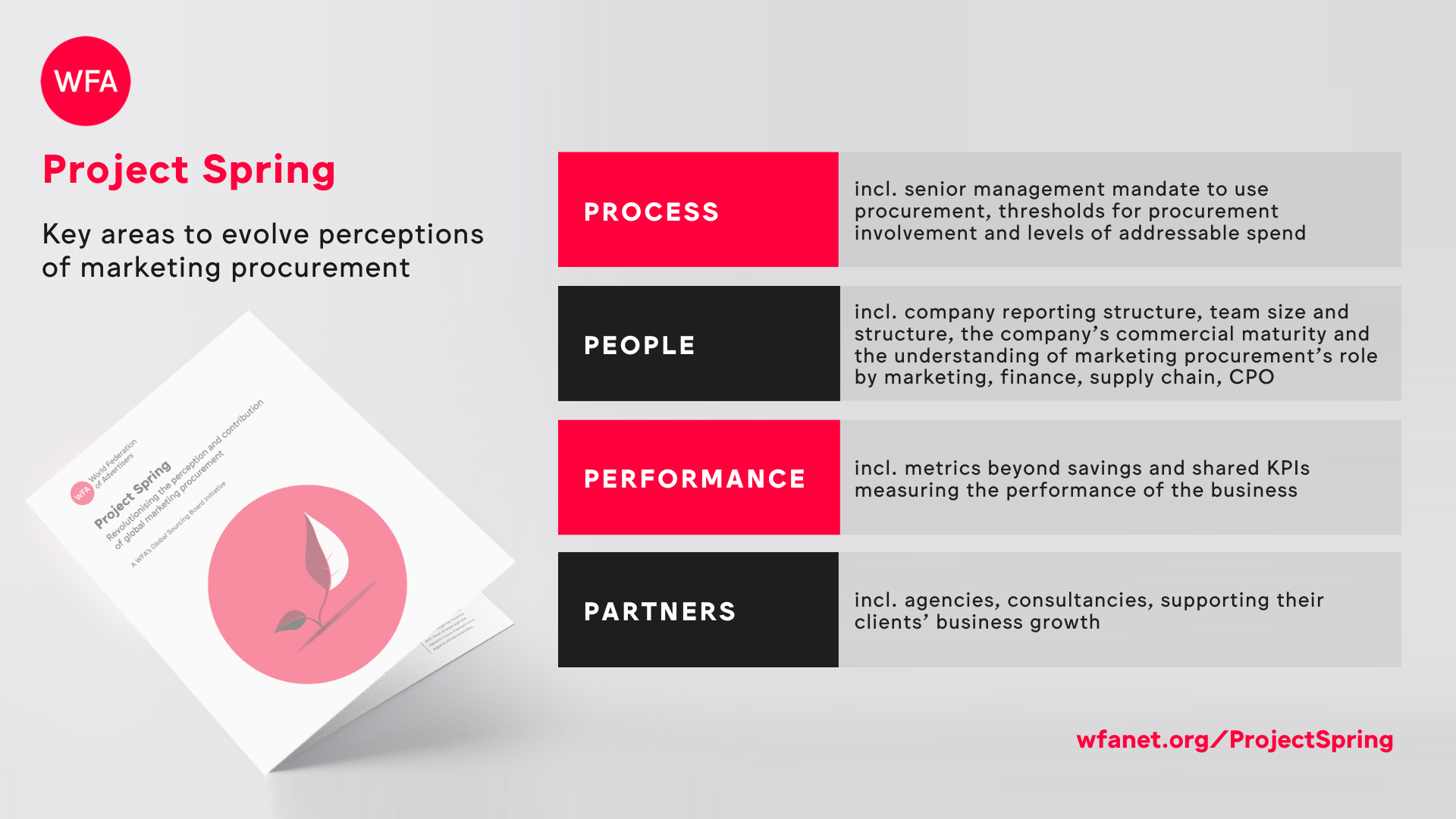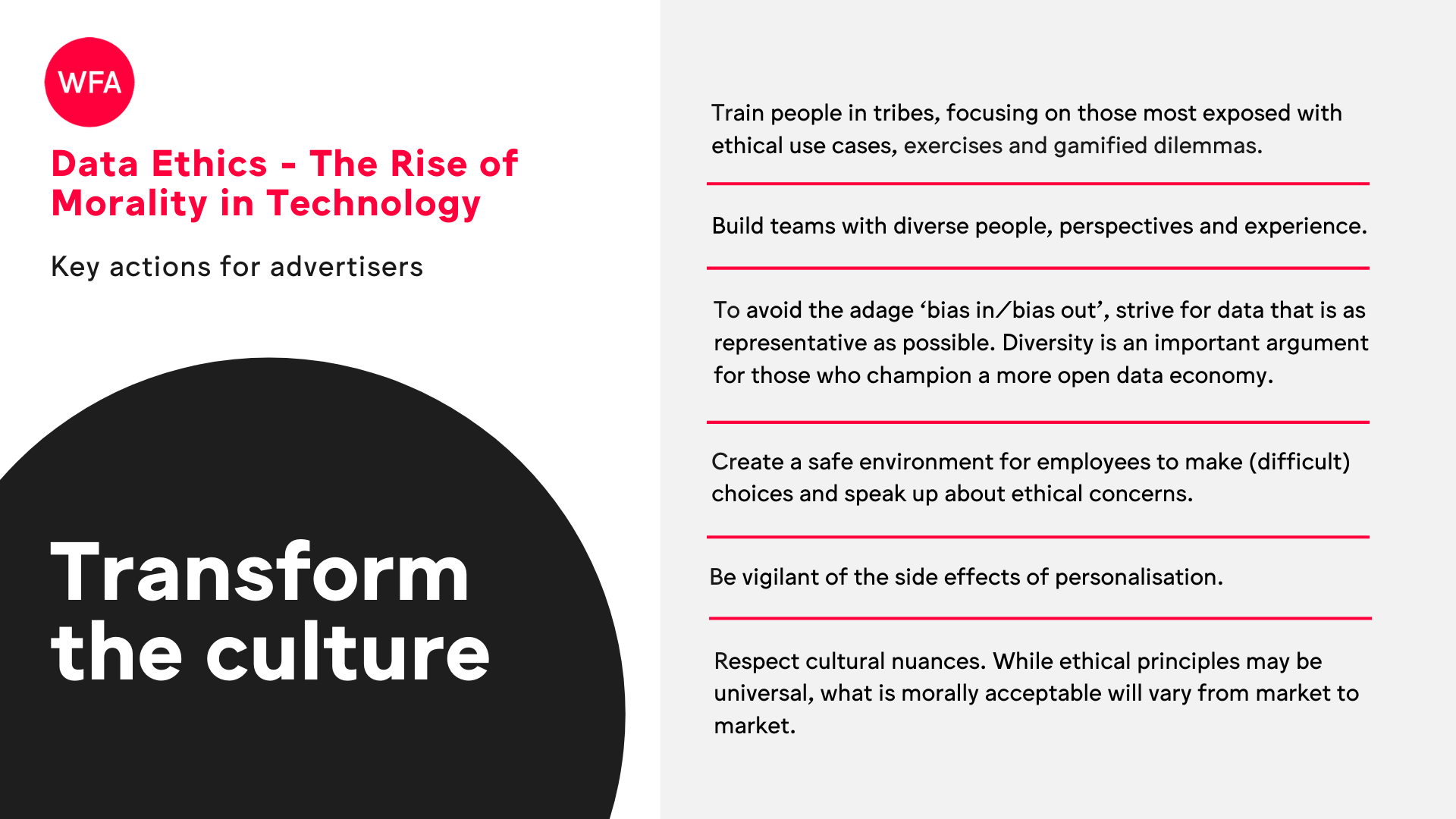Get analysis, insight & opinions from the world's top marketers.
Sign up to our newsletter.
We asked the chairs of our WFA working groups to reflect on what 2020 meant for the global media, marketing and digital policy agendas.

Clockwise from top left: Pratik Thakar (The Coca-Cola Company), Gerry D'Angelo (P&G), Tracy Allery (Nestlé), Prachi Prasad (Vodafone), Jacqui Stephenson (Mars), Jamie Barnard (Unilever), Astrid Williams (PepsiCo)
Pratik Thakar, Head of Integrated Marketing Communications, ASEAN Business Unit, The Coca-Cola Company, and Asia Pacific Chair, CMO Forum:
“A remarkable year calls for remarkable response, and as much as 2020 demanded unrelenting commercial focus from senior marketing leaders, it was very good to see our CMO community united across the globe in a commitment to brand purpose and people – consumers, employees and agency partners alike. The results of our global study on ‘The Marketer of The Future’ spawned rich conversations around capabilities as well as the transformation required to enable marketing organizations to thrive regardless of location or logistics. In-housing, especially for Creative services, is a bigger priority than it ever was, as is e-commerce. But in the race to shift traditional models towards direct-to-consumer engagement, I hope that as CMOs, we continue to challenge ourselves towards integrated marketing experiences, cutting-edge creativity and to keep pushing the envelope when it comes to marketing measurement. That is my hope for 2021.”
Gerry D’Angelo, Vice President, Global Media, P&G, and Co-Chair of the Media Forum:
“What a year it has been, full of highs and lows, professional and personal. In the midst of this it would be easy to overlook the progress that we have made, not just as the WFA Global Media Board but as the media industry as a whole. Looking back, the renewal of the Global Media Charter and the establishment of the Board were pivotal moments.The Charter provided clear focus on priorities such as cross-media measurement, brand safety and more recently addressability, and the Board brought together a small number of committed industry leaders to get personally involved.
The Global Alliance for Responsible Media (GARM) started with a small but mighty group of like-minded advertisers, agencies, publishers and trade associations but grew rapidly to substantial community of more than 100 members. Acknowledging that harmful content was an industry-wide issue, GARM sought to estimate the size of the problem and enable tracking of progress over time through industry-wide reporting, enabled by common definitions and metrics and independent auditing. GARM ensured that definitions of harmful online content were consistent across publishers and that progress was being reported in a consistent way. This included not just the incidence and reach of content identified and removed but also overall prevalence of harmful online content. Much has been achieved but there is still more to be done, especially in the area of greater controls for advertisers.”
Prachi Prasad, Global Learning & Capability Lead – Brand & Marketing, Vodafone, and member of the Capability Forum:
“As 2020 draws to a close one cannot but reflect on the profound implications for people. In particular, workplace learning moved from being in the ‘flow of work’ to being in the ‘flow of life’. Organisations dealt with cancellations, postponements and, above all, an acceleration of long-overdue virtual learning, challenging the status quo of classroom-based learning.
That has meant transforming classroom programmes, more bite-size videos, changing one-day courses with a class of 24 into two-hour modules with cohorts of eight and content curation over creation. Learning and Capability teams have moved to more innovative ways of design and delivery with communities and social learning on the rise. The Capability Forum was a valuable platform for knowledge exchange in this area.
The question now is to what extent these adaptations will become part of corporate learning and the capability building landscape? Many organisations will monitor effectiveness and progress and adjust their approach accordingly. We may settle into a new equilibrium in 2021!”
Tracy Allery, Director, Marketing Procurement Business Partner, Nestlé, Chair of the Sourcing Forum:
“The many challenges of 2020 highlighted the importance of a strong Procurement team. It was the right time for WFA’s Sourcing Board to release its ground-breaking Project Spring report, which argued that marketing procurement is at its best when its objectives are aligned with the business. This year was certainly proof of that. In the marketing space, it meant a focus on priorities such as growth, diversity, sustainability and effectiveness. It’s time for Procurement to pivot from an exclusive focus on savings to value.

The Sourcing Board supported this work with deep-dive explorations of engagement and alignment with stakeholders, strong agency relationships, and forums across our global community on diversity & inclusion, sustainability and career paths.
In 2021 we plan to keep moving forward, evangelizing an evolution of metrics, commercial leadership, onboarding and training for procurement in the marketing space as well as some common initiatives with our agency partner community. Our mission is to define world-class marketing procurement and set the standards that members of our community should uphold. We’re just getting started.”
Jacqui Stephenson, Global Responsible Marketing Officer, Mars, Chair of the Digital Governance Exchange:
“This has certainly been a year that we will never forget and that also holds true for the digital governance agenda. With more privacy-based lawsuits being filed than ever before, increased focus on the ethical challenges of using data to fuel advertising, and the continued demise of the cookie being accelerated by interventions from technology companies, it’s certainly been a year of note.
Social media platforms have become front and centre for regulators and advertisers, given misinformation concerns related to Covid-19 and the US elections combined with antitrust dominating the headlines in the US and Europe.
We have a taste of what’s to come in 2021 but 2020 has reminded us that digital governance is more important than ever. Take a well deserved holiday break to recharge your batteries for another busy year.”
Jamie Barnard, General Counsel, Global Marketing, Media & eCommerce, Unilever, Chair of the Data Ethics Board:
“2020 will be famous for many things but for some it was the year data ethics went mainstream. If you hang around the Zoom-equivalent of the office watercooler, it won’t be long before you hear someone talking about ethics in data, digital or AI. The defining moment for the WFA was the publication in June of the world’s first guide on data ethics for brands, “The Rise of Morality in Technology”.

The industry reaction to the WFA policy paper was overwhelming, providing a clear mandate for the WFA Data Ethics Board to continue its pioneering work: promoting the ethical use of data in advertising and influencing future policy. There will be much to explore in 2021, from the use of digital IDs and location tracking, to bid-stream data and biometric technologies. We look forward to putting principles into practice in 2021 and beyond.”
Astrid Williams, Senior Director Global Health & Wellness Policy, PepsiCo, Chair of the Responsible Advertising to Children (RAC) Programme:
“2020 has been a year like no other. In the spring we were all focused on how to keep the world fed, supplied and working and the policy challenges soon caught up with the new reality.
For the food industry, the emergence of Google as a “regulator” has been a surprise development and we are concerned that we will see more similar moves without consultation across the globe. The discriminatory threat to in-store promotions in the UK and the very real discriminatory sales bans in parts of Mexico are just some of the developments that have created a steady drumbeat of policy challenges.
As an industry – regardless of which sector we operate in – we need to continue to work with regulators to ensure a balanced approach. In order to be successful in those efforts, it is incumbent upon us to set ourselves high standards and keep to them. The RAC has a key role to play in facilitating those exchanges, helping us hold up a mirror to ourselves by bringing the outside world in.”
For more information or questions, please contact us





